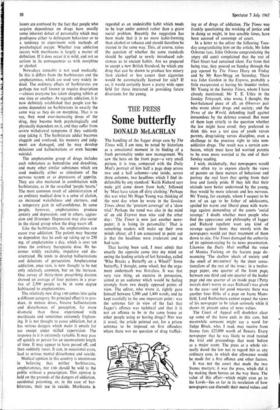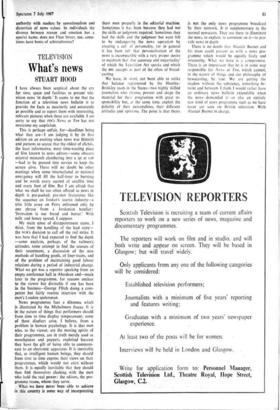Some butterfly
THE PRESS DONALD McLACHLAN
The handling of the Jagger drugs case by The Times will, I am sure, be noted by historians as a sensational moment in its finding of a fresh personality under new management. We saw the hero on the front page—a very small picture, it is true, compared with the Daily Mail's portrait of him half a page deep across two and a half columns—and inside, across three columns, two headlines which I find in- defensible by any standard: 'Keith Richard says nude girl came down from bath,' followed by 'Must have taken off dirty clothing.' Perhaps this was what Mr Hugo Young was thinking of the next day when he wrote in the Sunday Times about the 'prurient coverage' of a 'show trial.' Perhaps the trend was also in the mind of an old Express man who said the other day : 'The Times is now just another news- paper; it is losing its personality.' That is something readers will make up their own minds about; all I am concerned to point out is that the headlines were irrelevant and in bad taste.
That having been said, I must admit that exactly the opposite came into my mind on seeing the leading article of last Saturday, called `Who Breaks a Butterfly on a Wheel?' Some butterfly, I thought, some wheel; but the argu- ment underneath was first-class. It was that very rare thing, an exercise in persuasion,
aimed at an audience which would be feeling strongly from two deeply opposed points of view. The editor, who wrote it, rightly gave himself between 1,300 and 1,400 words, and he kept carefully to the one important point: was the sentence fair in view of the fact that Jagger's offence was technical and that it is not an offence to be in the same house as other people using or having drugs? Nor was it usual, the article pointed out, for a prison sentence to be imposed on first offenders where there was no question of drug traffick- ing or of drugs of addiction. The Times was frankly questioning the working of justice and in doing so might, in less sensible times, have been accused of contempt of court.
In a letter to the editor the following Tues- day congratulating him on the article, Mr John
Osborne (yes, John Osborne congratulating the angry old aunt) complained that the rest of Fleet Street had remained silent. Far from that being true, they poured on Sunday through the gap opened by The Times Diary on Friday and by Mr Rees-Mogg on Saturday. There was John Gordon in the Express, probably a little exasperated at having his thunder stolen; Mr Young in the Sunday Times, whom I have
already mentioned; Mr T. E. Utley in the
Sunday Telegraph, who wrote, I thought, the best-balanced piece of all; an Observer pair
who wrote about drugs and society; and the
News of the World, defending itself against innuendoes by the defence counsel. But none of them kept strictly to the question whether
the law might have erred; they preferred to think this was a test case of youth versus parents, drug-taking versus discipline, even a challenge to the precious right to take non- addictive drugs. The result was a certain con- fusion, which must have led worried parents to be even more worried at the end of their Sunday reading.
I wish, incidentally, that newspapers would more often try to express clearly the views
of parents on these matters of behaviour and
portray the real fears that spring from their love and family pride. If they felt that their attitude were better understood by the young, they would be more tolerant and less nervous. Mr Young, for example, whom I suspect to be not of an age to be father of adolescents, spoiled his warm and liberal piece with warn- ings against demanding of the courts 'social revenge.' I doubt whether most people who find the appearance and philosophy of Jagger and. Richard repellent want any kind of revenge against them; they merely wish the
newspapers would cut their treatment of them down to size. The Times damaged the authority
of its opinion-stating by its news presentation.
Likewise the Daily Mail muffled the voice of Monica Furlong on the feature page de-
nouncing 'The shallow ideals of society and
the smell of DECADENCE' by the sheer sensa- tionalism of the rest of the issue: in a twelve-
page paper, one quarter of the front page, between one third and one quarter of the leader page and one quarter of an inside page (Petty morals don't worry us says Richard') was given to the case—and for good measure there was another four fifths of a page on Jayne Mans- field. Lord Rothermere cannot expect the views of his newspaper to be taken seriously while it shows its present sense of news values.
The Court of Appeal will doubtless clear up some of the loose ends in this case, but meanwhile someone might say a word for Judge Block, who, I read, may receive from Stones fans £25,000 worth of flowers. Every newspaper that he was likely to read treated the trial and proceedings that went before as a major event. The press as a whole vir- tually dared the law not to regard this as any ordinary case, in which due allowance would be made for a first offence and other factors.
It was not the court that made the two Stones martyrs; it was the press, which did 'it by making them heroes on the way there. The value of this affair—which might even go to the Lords—lies so far in its revelation of how newspapers can discredit their moral values and authority with readers by sensationalism and distortion of news values. In individuals the divorce between reason and emotion has .a special name; does not Fleet Street, too, some- times have bouts of schizophrenia?







































 Previous page
Previous page